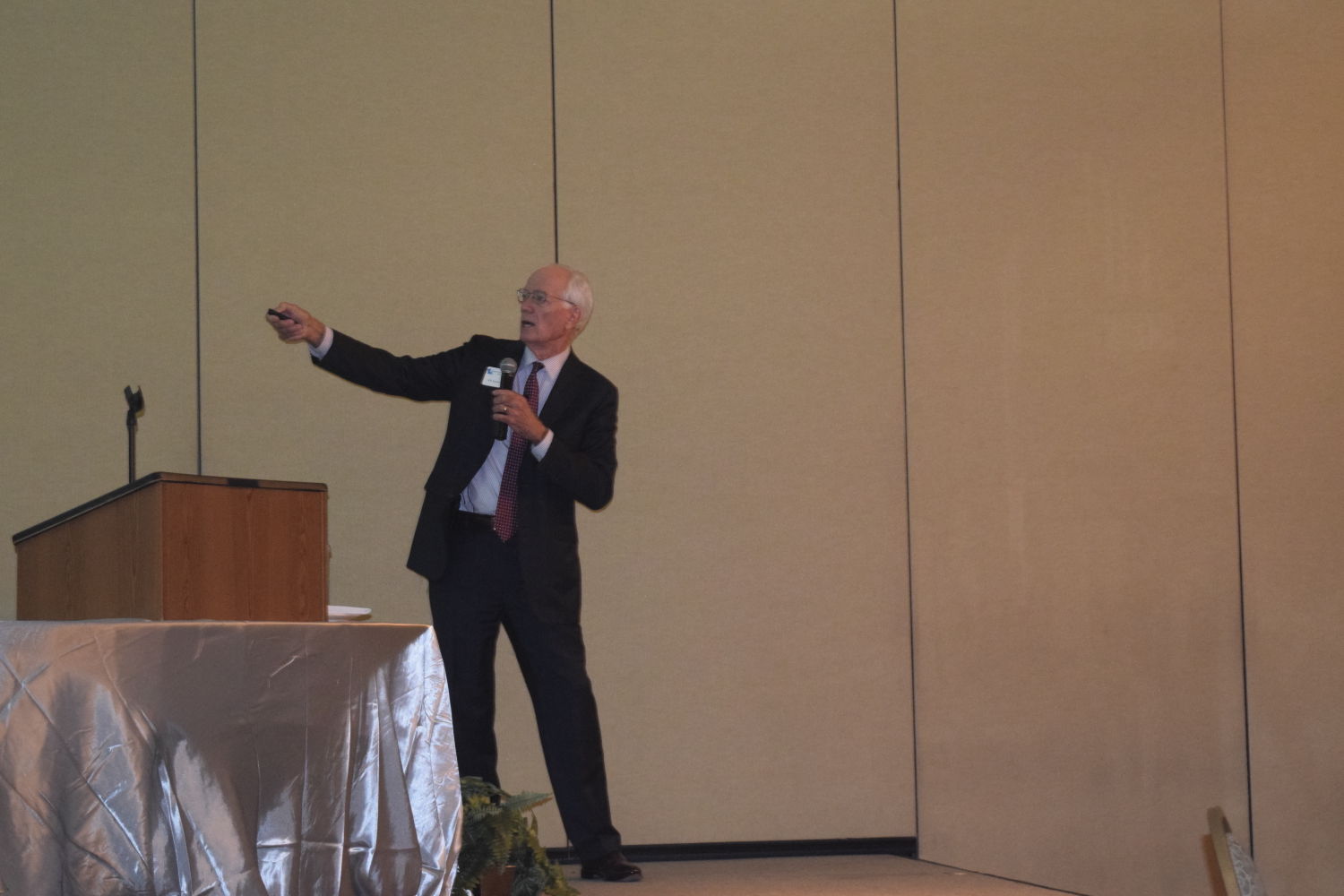
Pitch with the pros at Kemper Williams Park in Patterson
October 21, 201552nd State Representative District to choose between 2
October 21, 2015Louisiana economist Dr. Loren Scott forecasted that the bayou economy would bounce back in the face of the current oil-and-gas downturn.
The LSU professor emeritus laid out his views for south Louisiana while presenting the latest installment of his annual economic forecast of the state. Scott went over his “Louisiana Economic Outlook for 2016-17” for local government and business leaders during a Thursday luncheon at the Cypress Columns in Gray.
Scott first detailed the steep decline in oil prices over the past year, noting how he himself did not see oil falling to below $40-a-barrel at times this year.
“Our forecast for 2015 and 2016 was that the price of oil would be about $95-a-barrel this year, and about $90-a-barrel next year. We missed on that forecast,” he said.
Scott called the price of oil the second most difficult thing in the economy to forecast due to the amount of foreign government control over oil reserves. He said two-thirds of the world’s oil reserves are in lands where governments own the oil companies, and said one country in particular is behind the current market malaise.
“You never know what those governments are going to do. And one of them did something in the last year to cause this chaos that we’re going through right now,” he said.
According to Scott, Saudi Arabia has flooded the market with oil in the hopes of driving down the rapidly increasing U.S. production. The economist noted that since 2008, U.S. production has gone up 85 percent, mostly due to improved withdrawal from shale plays in the country. That large jump has resulted in a significant slide in U.S. oil imports.
“If you look at how much of our oil we imported back in 2008, we were importing about 66 percent of the oil we consumed in this country. A short time later, just in 2015, we are now importing 43 percent of oil we consume,” Scott said.
This drop in American importing meant the Saudis lost two million barrels of oil sales per day, according to the former LSU professor. American oil companies also figured out a way around the decades-long ban on exporting crude oil. They skimmed a bit of volatile gases from the top of the barrel of oil, and the Department of Commerce deemed the result a refined oil product, which is legal to export, according to Scott. These two developments led the Saudis to drive down the price of oil.
“When those companies went to the DoC in August and said can we export this, when it was really just crude, and the DoC said yes, the Saudis said, “Yes, hell no. First you eat into our U.S. market, now you’re eating into our international market?’” Scott explained. “They turn on the faucet, put a lot more oil on the market, boom! The price of oil goes down.”
The Saudi goal is for the lower prices to weaken production on the margins of United States shale plays, which have a much higher breakeven cost than the centers of the plays. According to Scott, the Saudis have succeeded so far.
“What they want to do is, they want to kill the edges. ‘If we can kill the edges of the shale plays, we’re going to stop the growth in U.S. oil production.’ And it has worked. U.S. oil production has already started to decline,” he said.
However, the Saudi successes do not spell doom for the South Louisiana economy, according to Scott. The economist noted just how brutal the 1980s oil downturn was on the region.
“It’s hard to imagine an area losing 25 percent of its jobs. It took y’all 10 years to get those jobs back. It was a horrible, horrible time for you,” the economist said.
Scott showed the steep rise in the number of people working in the oil industry leading up to the 1980s crunch. In 1973, 47,300 people in the Houma-Thibodaux MSA worked in oil and gas. That number jumped to 95,400 by 1981 as people from all professions tried to get in on the oil action. When oil prices fell in the decade, employment quickly collapsed. Today, about 47,900 work in the oil and gas industry.
Scott said that today’s sustainable employment levels and more reasonable banking practices take something like the 1980s collapse out of the cards.
“As a result, I think it’s numerically impossible for the 1980s to be repeated. If you go back to this chart, even given all the hits you’ve taken so far, you’re only down about 800 jobs,” he said.
According to Scott, Credit Suisse predicts a substantial increase in global demand for oil for 2016 and 2017, which should drive prices up. He forecasts the 12 other OPEC countries aside from Saudi Arabia will slow production, as the current low prices are harming them. Along with the decline in U.S. production, this will provide another upward pressure on prices.
“We believe the price of oil will average about $55 a barrel in 2016, which is not a big change. That’s about $6 more a barrel than what it’s selling now. And then up to $60 in 2017,” Scott said.
However, Scott noted that due to the volatility of the oil market and the impending deal with Iran, the price could tumble down further or reach the comfortable 2014 levels of $90 per barrel.
If the modest oil price gains are realized, the region’s economy will bounce back soon, according to Scott. However, he predicts the region will lose jobs over the next year before the rebound takes foot.
“We anticipate, you’ve already lost 800, we think you’re going to lose another 2,000 jobs. We think this malaise is going to hang around through 2016. Then in 2017 as that price gets up to $55-60 you’re going to start coming back,” he said.
Scott said that upward oil prices and the money coming in from the BP settlement will help kick start the local economy. He concluded by noting how the area’s economy has stood in the face of adversity in the past.
“The good news is, you always come up on the other side OK. You always do that. And I don’t think this going to be that deep at all. It’s going to hurt, but it’s not going to hurt anything like it did in the 1980s,” he said. •










